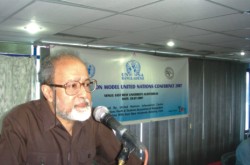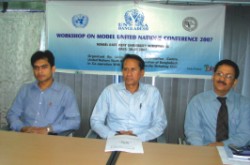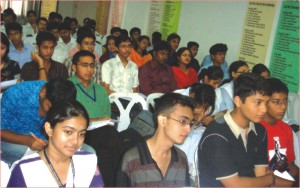Feature
Teaching theLanguage of Diplomacy
Farheena Rahman
Wars have been won and lost over words. Even in today's world where we talk about integration globalisation all alluding to a greater understanding of one another doesn't exist. We may speak the same language and yet still not be speaking the same language, we still haven't learnt to find a way to communicate across so many different contexts. So we all speak different languages, the language of business, the language of culture, the language of religion, hope, and so many more and then we have the language of peace or more accurately the language of diplomacy.
 So wars are not won on battle fields but in conference rooms, at press conferences, at summits and it is in these places that the fate of the world and nations are decided based on the eloquence, articulate speech and manoeuvring of words of poker faced, polite men and women in suits. So wars are not won on battle fields but in conference rooms, at press conferences, at summits and it is in these places that the fate of the world and nations are decided based on the eloquence, articulate speech and manoeuvring of words of poker faced, polite men and women in suits.
Contrary to what some might think this talent with words is something very few people are born with and even so its is something even those who are born with it must hone for a talent only becomes a skill when you take it to the next level. Helping the next generation improve and learn these skills has far been ignored in our country. Indeed very few higher education students even how the basic procedure in the UN works let alone understand that diplomacy is an art. In Bangladesh only a distinguished few get the opportunity to learn from experts how real diplomacy in the UN system works.
It has been the vision and mission of the United Nations Youth and Students Association of Bangladesh to provide the opportunity to understand the UN system and how diplomacy works within it to the next generation. They have achieved this to a large extent through Model United Nations, MUN, both nationally and internationally. However the number of students who have access to or know anything about participating in a MUN are also few and far between. It was this in mind that the UNYSAB partnered with the United Information Centre to jointly organise a Workshop on MUN. They did this in association with the East West University Debate Club and Radio Today, the official radio partner for the event.
 One wouldn't think that an event of this kind would generate the kind of interest and participation that it did. With over 600 students from all walks of life and different educational backgrounds and levels the East West University Auditorium where it was held on 20th, July, 2007 was full for both sessions. It was in many ways inspirational to see so many students on a Friday thirsty for knowledge. Despite the early start of the first session with registration starting from 8.30 a.m. in the morning there were lines of students waiting out side. One wouldn't think that an event of this kind would generate the kind of interest and participation that it did. With over 600 students from all walks of life and different educational backgrounds and levels the East West University Auditorium where it was held on 20th, July, 2007 was full for both sessions. It was in many ways inspirational to see so many students on a Friday thirsty for knowledge. Despite the early start of the first session with registration starting from 8.30 a.m. in the morning there were lines of students waiting out side.
The senior experienced and distinguished speakers at the workshop included former ambassadors and former foreign ministry officials. They were there to share their experiences and answer questions based on their real life knowledge of world politics. From Mr Jamil Majid, Former Secretary & Principal of Foreign Service Academy, Mr M Afsarul Qader, Former Secretary & Ambassador, Mr. Waliur Rahman, Former Secretary & Ambassador, MoFA & Executive Director, BILIA and Mr. Kazi Ali Reza, Officer-in-charge of the UNIC, Dhaka, they were all inspiring, giving a real sense of the history of diplomacy our country has. Speaking on wide range of issues from the inner workings of the UN to the cold hard facts of international relations and politics they managed to give an insight into that world. From a piece of history to the young leaders prominent UNYSAB members all of whom have many international MUN experiences under their belt. They briefed the students on both the procedural elements of participating in a MUN and the real MUN as well as the paper work, from policy statements to resolution drafting and writing. Dr. Taufiqul Islam Joarder, President, UNYSAB (Team Leader, Asia-Pacific Regional MUN Conference, Beijing, 2004 and Team Leader, World Model UN Conference, Geneva, 2007) and Nafiz Imtiaz, Vice-president, National Affairs, UNYSAB (WFUNA Asia-Pacific Regional MUN Conference, New Delhi, 2006 and Asian International MUN Conference, Beijing, 2007) both spoke in the first session. In the second session I, Farheena Rahman, Vice-president, International Affairs, UNYSAB (Team Leader, WFUNA Asia-Pacific Regional MUN Conference, New Delhi, 2006 and Team Leader, Asian International MUN Conference, Beijing, 2007) Shadman Sadikin, Executive body member (WFUNA Asia-Pacific Regional MUN Conference, New Delhi, 2006) spoke in the afternoon session. Contrast in styles from the younger speakers to the ex-diplomats and the different information provided strangely complimented each other, giving the kind of comprehensive knowledge from all angles.
However in the end it was the audience that stole the day with their eager responses and participatory spirit. The mesh of students form public and private schools, from all walks of life and from different points of view made every question and every reply from audience not thought provoking. The depth of knowledge and the kinds of issues raised showed that the students of today keep up and want to keep with the rest of the world. The kind of rare display of intellectual prowess and understanding of international issues was even had the veteran diplomats impressed.
 The turning pointy and I think stand out moment the idea of which carried through till end was the question about whether countries like ours have or display poor diplomacy. This issue later came up at the end of the day when Mr. Kazi Ali Reza pointed out that if young members of such organisations such as UNYSAB keeping winning awards for diplomacy abroad, we cant say we are a country that has poor diplomatic abilities. On that thought maybe then we should all acknowledge that it is not only our heads of state, and government officials that represent our country abroad but every Bangladeshi that goes abroad. The impression we make for our country when we attend international conferences on almost anything we are acting as diplomats of our country. The thought that we are representatives of our people and country is humbling and aw inspiring and maybe that is what we need to feel to be able to do it well. The turning pointy and I think stand out moment the idea of which carried through till end was the question about whether countries like ours have or display poor diplomacy. This issue later came up at the end of the day when Mr. Kazi Ali Reza pointed out that if young members of such organisations such as UNYSAB keeping winning awards for diplomacy abroad, we cant say we are a country that has poor diplomatic abilities. On that thought maybe then we should all acknowledge that it is not only our heads of state, and government officials that represent our country abroad but every Bangladeshi that goes abroad. The impression we make for our country when we attend international conferences on almost anything we are acting as diplomats of our country. The thought that we are representatives of our people and country is humbling and aw inspiring and maybe that is what we need to feel to be able to do it well.
Even if none of the students that attend such workshops and that have worked and participated at model UN's and related activities go into the Foreign Service we are assured the best diplomats and representatives this country has to offer. Each of the students that participated in this workshop alone will represent us in, business, banking, medicine, architecture, law and every other field they go into. That means we are teaching the next generation of diplomats whether we realise it or not and workshops like the one held can help hone their skills and make the very best that they can be.
|
